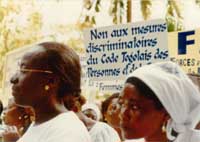In Turkey, the women's movement scored a success when in November 2001 the civil code was amended and acknowledged the equality of spouses.
In Morocco, one of the issues presented at the huge march held in Rabat was the improvement of the status of women.
In Mozambique, the women participating in the March proposed that the government take into account the following considerations in the new family law: give marriage a role other than that of a union for reproductive purposes; disallow women from being sent back to their family of origin if they do not bear children; remove men's status as family head and give wives decision-making power; give women the right to administer the family's resources and to take part in decisions concerning the family; raise the minimum age to marry for girls, from 14 to 16, the same minimum age as for boys; recognize common-law, traditional and religious marriages; allow women to keep their possessions and land in the event of their husband's death or if they themselves are repudiated.
A long and exacting task! However, as Graça Machel, godmother of the March in Mozambique, pointed out at the launching of the March in Maputo: "The March is a process. We have the responsibility to seek changes in women's rights in the most hidden away spheres."





